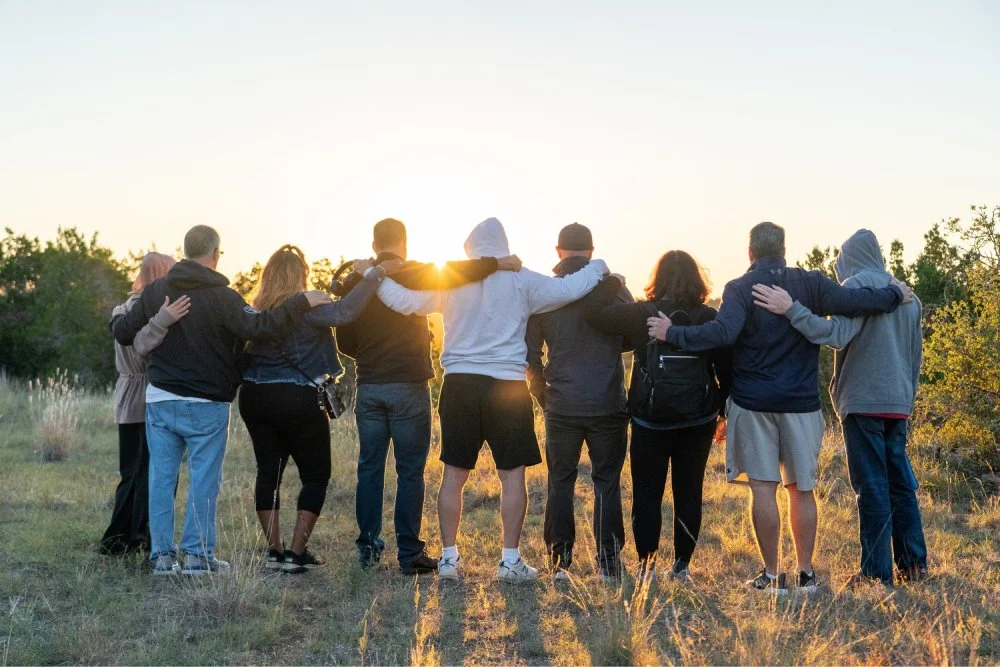The corporate event planning guide: Create the best team offsites and retreats
Planning
The corporate event planning guide: Create the best team offsites and retreats
BoomPop Team · 12/5/2022Just last month, Bloomberg reported that offices in the nation’s top 10 cities are nearly half empty. Earlier this year, McKinsey shared that 90% of executives said they would offer remote and hybrid work in cases where on-site work was non-essential.
These findings trigger an important question:
How are colleagues replacing those impromptu brainstorming sessions, casual water cooler chats, or celebrating a new product launch?
While virtual events can be a worthy stand-in, nothing beats face-to-face connection. This is one of the main reasons why in person company events are exploding in popularity as a means to help employees bond and feel engaged at work. The corporate events world is longer laser focused on event marketing
Today, we’re going to share everything you need to know about what goes into the work of event planning for team experiences.
We’ll share:
The “why” behind corporate events
How to choose the right type of event and navigate the planning process
Tips for creating an impactful team building experience
What you need to know about working with an event planner
Let’s get started!
The purpose and value of corporate events
Let’s start with the basics: what’s the point of planning a team event?
Some leaders may still see offsites and retreats as just another meeting, another conference, or another workday in a different locale. At BoomPop, we see things differently.
A corporate team event, when planned for impact, is a strategic team building event that cultivates inspiration, strengthens connections, and reignites engagement. It’s not just an opportunity for you to post on social media about how amazing your company culture is—it’s a chance truly build and nurture that culture from the ground up.
It could be one day or five days. It could be 100% fun or half fun, half work. Everything is totally customizable. Depending on your team’s unique requirements, there is a way to design a team event to produce immense, measurable benefits.
Events are the ultimate team building tool for the remote workforce—versatile, easy to implement for any kind of organization, and provide instant value.
Why have a corporate event?
We believe these events are important. But what does the data say?
Well, we’re dealing with a total shift in the world of work. Companies are struggling to find qualified talent, collaboration is taking a hit in remote environments, quiet quitting is on the rise due to low engagement and poor cultures, and nearly 20% of U.S. workers say their mental health is fair or poor.
All these factors, and many more not mentioned, impact your company’s bottom line in terms of retention and hiring costs, productivity, etc…
As a leader, how do you combat these struggles?
One strategy is to approach the way you meet and connect differently. Events are the ultimate solution. Retreats boost engagement, improve communication, and increase retention while decreasing loneliness and mental health struggles.
Team offsites transform the way people look at their employers through exciting experiences that support both employers and team members simultaneously. It’s an easy win that can set your company apart.
What type of events are most popular?
If you’re sold on the value and potential impact of an event, your next question is naturally: what type of event should I organize?
Since about 70% of our BoomPop clients are first-timers when it comes to planning a company event, one question we get a lot is what type of corporate event is most popular right now. There are a few we see often:
Company retreats, kickoffs, and annual meetings
Executive and leadership retreats
Work-and-play offsites for teams and startups
Product launches, client networking summits, and award ceremonies
What you choose depends on your needs as a company—but in general, we’ve found that no matter what you choose, your priority should be creating an unforgettable experience for everyone on your guest list.
Since nearly 75% of team members that work remotely have said they miss the social aspect of their job, it’s critical to focus on reigniting those connections. No matter the type of event or where you host it, people simply want to connect.
Not only are you replacing water cooler chats, you’re providing something even better: meaningful shared experiences that bond teams for the long-haul.
The planning process for a corporate event
Planning an event is a big undertaking, but with the right support and strategy in place, it’s totally manageable to produce a wide variety of events that make a significant impact on your company’s culture and growth.
Without further ado, let’s dive into our top tips for planning company events.
Start with your event goals
Your goals are the foundation for everything you’ll do. They’ll guide the metrics you use to measure success, help you align events with important company milestones, and provide clarity to your event organizers and attendees.
To create goals for a team corporate event, follow these steps:
Determine the purpose of the event: The first step in setting goals for a team corporate event is to identify the purpose. Is it a team-building event, a product launch, a celebration, or something else? Who is the target audience? What resonates with them?
Identify the expected outcomes: Once you have determined the event's purpose, identify the expected outcomes. For example, if it's a team building event, the goal may be to improve communication and collaboration among team members. If it's a product launch, the goal may be to generate leads and increase sales.
Share goals with the team: Once you have created your goals, share them with the team to ensure that everyone is on the same page and working towards the same objectives. Any key stakeholders should be brought in for feedback.
Measure progress and evaluate success: During and post-event, track progress towards your goals and evaluate whether the event was successful in achieving them. If you’ve done this for past events, use those insights to shape the event plan for your next one.
Creating an event budget and pricing estimates
Once you understand what your event is setting out to accomplish, you’ll want to start determining your budget and what you want to prioritize within it. Doing so as early as possible is going to help you determine which locations are within reach, what types of activities are feasible, and how many days you can invest.
If you’ve never planned a company retreat or meeting before, our event budget examples should help make things simpler! They’ll give you the full picture of what line items to consider, including both variable (i.e., food and beverage) and fixed (i.e., meeting space) costs.
Some significant costs, like hotel stays, are obvious—others, like materials printing and signage, may not be something you would have thought to plan for. Those small, unexpected expenses can add up fast.
Planning an event location and venue
Think of your destination as the blank canvas for your masterpiece. Every locale has its unique advantages, sights, and entertainment value. But with that, you need to consider what aligns with your team’s personality and goals.
To find the perfect fit destination, ask a few questions:
Do you want a locale that’s familiar and close to home for ease since the entire company is attending? Or does a new destination that will excite and show even greater appreciation feel more aligned?
What sort of activities will our team enjoy? Where can you find those activities?
Will we be spending more time meeting or out and about in the city?
How many days will we spend there? Is the travel time to the destination for the majority of the team sensible for that duration?
Do we have the budget to travel to this city in terms of airfare and average hotel rates that time of year?
What did our pulse surveys indicate the team may enjoy?
You want to be really intentional with this step. After answering those questions, make a shortlist of destinations and compare experiences to determine which is the best fit for your team.
Planning your event activities and agenda
The agenda planning phase is where things really start to come to life.
This phase is two-fold. You want to start by considering your management team’s goals, but pair that with your team member’s desires.
After management determines what their strategic goals are for the meeting (i.e., is it simply creating connections or is it an annual sales kick-off announcing the next year’s strategy), it’s time to get team input. For that, you can either send out a new pulse survey if you haven’t done one in a while. Or you can create a new survey specifically designed to get input for team offsite planning.
If your team pulse surveys indicate that they may be struggling with mental health and burnout, consider a glamping retreat with yoga and meditation sessions, a chartered boat tour, and maybe even a private massage.
On the contrary, if they are craving adventure and are ready to brainstorm new ideas, choose Joshua Tree, CA, where you can do rock climbing, hiking, and wine tastings, mixed in with co-working sessions.
If everyone is seeking an opportunity for professional development, bring in a notable keynote speaker and plan breakout sessions.
Your options are virtually endless, so choosing what’s right will depend on your unique situation.
Tips for a fun and productive corporate event
So, how do you make sure you’ve created a successful corporate event? We have some tips.
Gather feedback before and after the event
We’ll always come back to the importance of surveys.
Team members that are highly engaged are 3x more likely to say they feel heard by their management team. So, listening starts with asking important questions. In a remote-first workplace, surveys are a great way to accomplish this, as they don’t require a level of facetime that is more difficult to achieve.
Here are a few questions you can start with for your pre-offsite and post-offsite surveys! Follow-up is just as important, as it allows you to improve your next event and streamline your planning process.
Prioritize inclusion and safety
Within those surveys, you should check-in about attendees’ preferences regarding comfort level with activities, COVID precautions, dietary restrictions, accessibility challenges, etc.
Upon receiving those responses, cater your offerings to your team accordingly. Do a mocktail-making class versus a wine tasting. Ensure you contract a hotel with accessible sleeping rooms and meeting rooms. Require pre-offsite COVID testing. Choose a destination that is known for its acceptance of those who identify as LGBTQIA+.
The actions you need to take to make everyone feel safe, secure, and supported will become clear as long as you ask the right questions during the survey phase of planning. And ensuring this is a top priority will only positively impact the efficacy of your team offsite as you gain your employee’s trust with a team offsite that puts their preferences at the forefront of planning!
Balance work and play
Spoiler alert: Employee engagement isn’t going to come from hours upon hours of PowerPoint.
While getting some work and strategy sessions in is ideal for a company offsite, creativity and connection are born from getting out into the world and having a little bit of fun. In fact, nearly over 1/3 of U.S. employees say their most creative ideas are born during company travel and getting on the road.
That’s why it’s so important to mix work and play at your company offsite. Even if your goal is to kick off the new year and talk annual goals or plan a new offering, getting people out and interacting with one another in new ways will only add value to those work sessions!
Understanding the role of corporate event planners
Whether it’s a team trip, a trade show, a fundraising dinner, or a pop up experience, companies employ planners for an incredible variety of event types. Here’s what you need to know to decide whether working with one is right for you.
What do event planners do?
A corporate event planner is responsible for coordinating and organizing various types of events, such as conferences, product launches, business meetings, team building activities, and more. These planners work with the company itself or as a third party service provider. They determine the event's objectives, budget, and scope. They then develop an event plan that includes logistics, such as venue selection, catering, audiovisual equipment, transportation, accommodations, and any necessary permits or licenses.
The event planner also manages vendors, negotiates contracts, and ensures that the event runs smoothly and according to plan. They are responsible for overseeing every aspect of the event, from planning to execution, and may work with a team of staff members or contractors to ensure its success. A corporate event planner must be highly organized, detail-oriented, and able to work under pressure while ensuring that the client's goals are met within budget and on time. Ultimately, they’re experts at project management and juggling a variety of tasks at once.
Why should I hire a planner?
Companies seek the help of a corporate event planner for a variety of reasons, and many use a combination of in-house and third party resources to make their events happen.
Here are some of the reasons businesses might seek out event management services:
Expertise and experience: Corporate event planners have the knowledge and experience needed to plan and execute successful events. They are familiar with the latest trends, technologies, and best practices, which can help ensure that the event runs smoothly and is well-received by attendees. They may also have access to useful event management software.
Time-saving: Planning a corporate event can be a time-consuming task that requires a lot of attention to detail. By hiring an event planner, companies can save time and focus on other important tasks.
Event budget management: Corporate event planners are skilled at managing budgets and can help companies stay within their budget while still creating a successful event. Whether it’s estimating costs or negotiating pricing, they know how to navigate all of the financial components of an event.
Networking and vendor management: Event planners have established relationships with vendors and suppliers, which can be beneficial at every stage of the planning process, from negotiating a rate to making sure everything is going smoothly on the day of the event.
Creative input: Event planners can bring fresh ideas and creative solutions to the event planning process through their know-how on the latest trends.
Long story short, hiring an experienced corporate event planner can help ensure that the event is well-planned, organized, and executed, resulting in a successful and memorable experience for attendees.
Ready to plan your corporate event?
As you can see, there is a lot of thought and work that goes into planning an event that generates ROI for your organization. But just think about the fact that hosting an epic company offsite could be the start of a new era for your team.
We’ve seen firsthand the enormous positive impact these events can have. Hear more from BoomPop customers or get in touch with our expert team of planners!




















